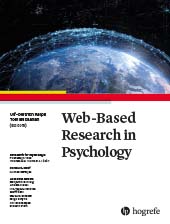Call for Papers: “Real-World Bio-Psycho-Social Assessments”
A Topical Issue of the Zeitschrift für Psychologie
Focus of the Topical Issue, Aims, and Scope
(Digital) Real-life and real-time data collection methods offer unprecedented opportunities to advance the understanding of and to promote mental and physical health. Collecting and transmitting data remotely offers great opportunities, but also many challenges. Real-world bio-psycho-social assessments allow for examining the links between psychological, situational and social influences and mental and physical well-being while taking into account not only inter- but also intra-individual variation. They also allow to derive and evaluate interventions that provide tailored support when required. Multidimensionality and the large amount of data, however, pose a challenge, for instance complex data analysis and visualization techniques. Moreover, recruiting and retaining participants may be more difficult due to increased participant burden and potential data security concerns.
In this call for papers for the Zeitschrift für Psychologie, we invite contributions that advance research methodology and practices of acquisition and evaluation of multidimensional data in everyday life. We aim at offering researchers concrete suggestions for extending their methodological portfolio, for example, through the inclusion of multiple data sources (e.g., activity trackers, physiological markers etc.), suitable data analysis techniques, or the application of digital technologies in interventions such as to promote physical activity or to boost the effectiveness of psychotherapy. How can we identify patterns in lifestyle behaviors and psychological variables in daily life? What are opportunities of consumer wearable assessment in biobehavioral research? But also crowdsourcing and collaborative analyses or digital nudging are among the topics covered by this issue.
We invite contributions that use intensive longitudinal data collection, ideally a combination of biological, psychological, behavioral data collection. Other contributions that include survey or experimental data, systematic reviews and meta-analyses are also welcomed. We explicitly encourage submissions that offer recommendations on methodological issues in the context of real-world bio-psycho-social assessments. The contributions should further discuss the potential of real-world bio-psycho-social assessments in theory development, theory testing, prevention, and psychotherapeutic intervention.
How to Submit
There is a two-stage submissions process. Initially, interested authors are requested to submit extended abstracts of their proposed papers. Authors of the selected abstracts will then be invited to submit full papers. All papers will undergo blind peer review.
Stage 1: Structured Abstract Submission
Authors interested in this special issue must submit a structured abstract of the planned manuscript before submitting a full paper. The goal is to provide authors with prompt feedback regarding the suitability and relevance of the planned manuscript to the special issue.
The deadline for submitting structured abstracts is October 15th, 2022.
Feedback on whether or not the editors encourage authors to submit a full paper will be given by November 15th, 2022.
Submission Guidelines for Structured Abstracts
Structured abstracts should be within four pages and may encompass information on each of the following headings: (a) Background, (b) Objectives, (c) Research question(s) and/or hypothesis/es, (d) Method/Approach, (e) Results/Findings, (f) Conclusions and implications (expected).
Structured abstracts should be submitted by email to the guest editor Jana Strahler (jana.
Stage 2: Full Paper Submission
For those who have been encouraged to submit a full paper,
the deadline for submission of manuscripts is February 15th, 2023.
The full papers must be submitted through the online submission system of the journal, Editorial Manager. Full manuscripts will undergo a blind peer-review process.
Submission Guidelines for Full Papers
- •Only English-language submissions can be considered.
- •Contributions must be original (not published previously or currently under review for publication elsewhere).
- •Review and original articles should not exceed 45,000 characters and spaces in length, including references, figures, and tables (allowances for figures and tables should be deducted on the basis of size: approximately 1,250 characters for a quarter-page figure/table).
- •All research syntheses should adhere to the meta-analytic reporting standards (MARS) proposed by the APA (http://www.apa.org/pubs/authors/jars.pdf). Additionally, authors should include a statement in accordance with the Preferred Reporting Items for Systematic Reviews and Meta-Analyses (PRISMA) statement (http://www.prisma-statement.org) as a supplemental file for review.
- •Other submission formats (short reports, research summaries, opinion pieces, etc.) are also considered, please contact the editors for details.
- •Reference citations in the text and in the reference list should be in accordance with the principles set out in the Publication Manual of the American Psychological Association (7th ed.).
- •Supplementary material must be made available through PsychArchives: https://www.psycharchives.org/
- •See also any recent issue of the journal.
For detailed author guidelines, please see the journal’s website at www.hogrefe.com/j/zfp/
Timeline
- •October 15, 2022: Abstract submissions due
- •November 15, 2022: Feedback to authors
- •February 15, 2023: Full paper submissions due
- •April 15, 2023: Feedback to authors of full paper submissions due
- •May 15, 2023: Revised manuscripts due
- •May 31, 2023: Editorial decision about acceptance/refusal of revised papers due
- •Issue 4, 2023: Publication of topical issue
About the Journal
The Zeitschrift für Psychologie, founded in 1890, is the oldest psychology journal in Europe and the second oldest in the world. One of the founding editors was Hermann Ebbinghaus. Since 2007 it is published in English and devoted to publishing topical issues that provide state-of-the-art reviews of current research in psychology.



